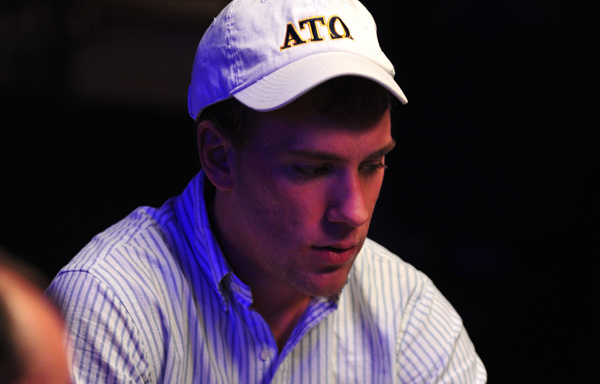The skinny twenty-one-year-old in the Alpha Tau Omega hat at the center table doesn’t like his odds. He’s holding the ace of spades and the jack of diamonds, but the flop was the nine of hearts, ten of spades and six of clubs–not exactly a four of a kind.
Or much of anything, for that matter. His chips are looking a little lonely, too, whittled down to a meager $650,000. Just a few moments before, he tweeted something possible only for speculators, investment bankers and professional poker players.
“Just lost 1/2 mil.. damnit.”
The turn is revealed: the four of clubs. Not good – he was hoping for an ace. One more card to go. The odds are against him, and, oh, does he know that. This is the World Series of Poker, after all. There’s no room for that kind of error. The dealer delivers the river: it’s the six of hearts. The opponent calls, and just like that, the skinny 21-year-old at the center table is busted. But it’s not as if he’s going home empty handed. Quite the opposite, actually – he’s walking out with nearly a quarter million dollars in profit.
And who says gambling doesn’t pay?
Meet Jonathan Schoder, Goizueta Business School junior and Professional Poker Wunderkind. Over the past few years, he’s played millions of hands in tournaments across the globe and online, culminating in his performance at this year’s World Series of Poker where he finished in 36th place. And while that might at first seem disappointing, in a field of nearly 6,600 entrants it’s more than impressive, especially for a competitor who is half the age of many of his opponents.
“There’s a lot of rich businessmen, who are really, really bad,” Schoder said in an interview with the Wheel. “But if you see a young guy with a $10,000 buy-in, [he’s] from the generation of online kids, 19-25, who understand the math side of it and have a good understanding of the game.”
Schoder himself belongs to that swell of young poker professionals who came of age at the height of online poker. For such a prodigious talent, one might think that Schoder has been honing his skills since childhood, practicing hours a day on his path to poker virtuoso. As it turns out, his professional career was a bit of an accident. In the summer of 2009, freshly graduated from Fort Lauderdale’s Pine Crest School, Schoder, who was better known in those days as a nationally ranked chess player, chose to take a year off before coming to Emory in order to hike the Appalachian Trail. It was a fateful decision.
“I started out, and three weeks into it, my back gave out, and I had to stop and come back home,” Schoder said in a 2010 interview with Emory Magazine. Back in South Florida with little to occupy his time, Schoder turned to online poker to entertain himself and maybe even earn a little pocket change.
“I needed to do something for about six months,” Schoder said, “and I needed to make some money, so I started playing poker for something like ten to twelve hours a day.”
His years of chess helped propel his skills, but didn’t provide all the answers. “There are similarities [between chess and poker],” Schoder explained, “but poker is [the] next step – in chess, you know everything, it’s a perfect game of information. But poker brings in a chapter of something you don’t know. It’s not only math based but also psychology based. Short term variants. You have to understand the player.”
Still, even in a game of chance, practice makes perfect. Schoder estimates that he played one and a half million hands in those months, sometimes juggling up to 24 games at once. But playing hands, he learned, isn’t everything.
“At the top level, I would do research where I could go back and replay the hands, also looking at what opponents are doing. At that level, you play against the same people every day. Especially with the other online players, you talk to other people about hand histories.”
Schoder doesn’t like to talk about his earnings, but suffice it to say, being an online poker shark netted him a whole lot more than most gap year jobs. Along with the success he was experiencing came an inevitable debate: is college the right decision when there’s just as much, if not more, to be gained from playing professional poker? A tough choice for many, but in the end, a clear one for Schoder.
“You don’t know whether this game is just a fad or going to last 10 or 15 years,” Schoder said. “And thank God I did [go to college], because December of freshman year [in 2010], online poker got shut down.”
With those tables closed off, many turned away from poker for good. But not Schoder, who began to take his talent to offline events, first in Florida and then around the world.
“I played a couple of $1,000 and $1,500 events both in Florida and in Vegas,” Schoder said, referring to the dollar value of the buy-in required for entrants. “I also made the trip out fall semester last year to play in the Venetian Deepstack tournament series.”
Although he didn’t win these events, they weren’t a complete loss.
“I had minimal results in both – no major cashes but enough to pay the bills.” More importantly, they established Schoder’s reputation as a world class player both on and offline. Backed by his newfound distinction, Schoder chose to take his biggest gamble yet: the World Series of Poker (WSOP), a No Limit Hold’em tournament with a pot of over $62 million. Only one thing stood in his way: a hefty $10,000 buy-in.
“You’re never supposed to put in more than 3 percent of your income up for one tournament,” Schoder explained. To make up the difference, he reached out to his community to raise the money he needed for his buy-in. “I went out to friends and people I’ve played poker with and let guys buy a percent of me with a 12 percent markup. In the end, I sold around 40 percent of myself. It’s nice to have friends rooting for you, and I started a WSOP Twitter,” Schoder said, referring to his @SchoderWSOP, through which he live tweeted most of the main event. Some of his most exciting hands will also be shown during ESPN’s coverage of the WSOP in early October.
For those who had faith in Schoder, their money proved to be in good hands. Entitled to a portion of his winnings corresponding to their own contribution, Schoder’s backers received quite a return on their investment: every $100 put forth yielded over $2,000 dollars in profit. But the biggest winner was, of course, Schoder.
“A lot of people ask what I’m doing with the money,” Schoder said. “So far I haven’t made any big purchases, but I’m probably going to drop some money on golf clubs, and might splurge on a Hublot or something. It’s important to keep your poker money (work money) separate from your spending money, but you also have to treat yourself to something nice once in awhile.”
Schoder doesn’t know if he’ll turn to poker full-time after college, although he certainly could if he wanted. Maybe it comes as little surprise, but he’s got his eye on a different sort of gambling.
“Investment banking. I want to do mergers and acquisitions,” he said when asked of his career plans. “I’ve also been told that sales and trading is most relatable to poker. A lot of people in the world of poker have finance backgrounds.”
Whether it’s buy-ins or buy-outs, blue chips or clay ones, no one knows what’s in the cards for Schoder. But if it’s a betting game he wants, Schoder’s success sounds like a safe bet. With a degree from Goizueta and a big pot of gold, the odds are looking better every day for this ace among Eagles.
– By William Partin III
The Emory Wheel was founded in 1919 and is currently the only independent, student-run newspaper of Emory University. The Wheel publishes weekly on Wednesdays during the academic year, except during University holidays and scheduled publication intermissions.
The Wheel is financially and editorially independent from the University. All of its content is generated by the Wheel’s more than 100 student staff members and contributing writers, and its printing costs are covered by profits from self-generated advertising sales.






Great job with this first issue, Wheel!